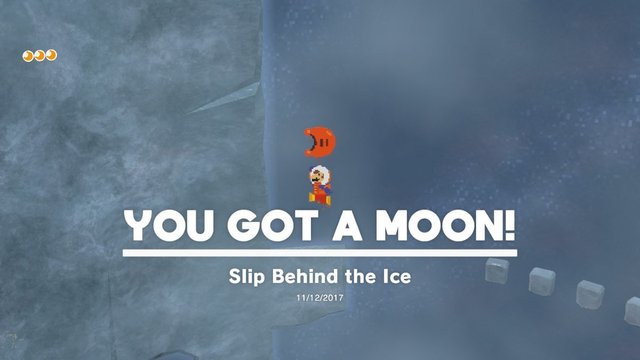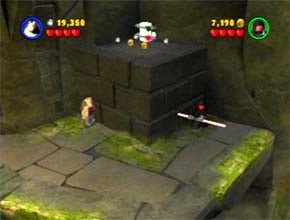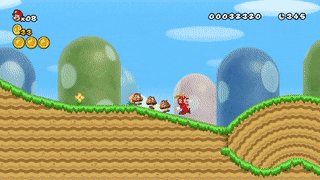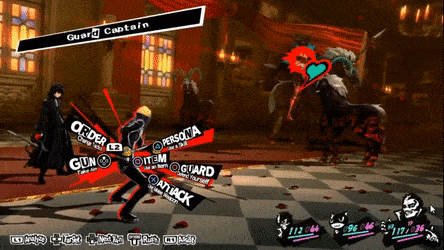The Search for the Dash Button: A Response to Razbuten
Recently YouTuber Razbuten uploaded a video titled “What Games Are Like For Someone Who Doesn't Play Games”. In the video, he chronicles an experiment he conducted where he had his wife play nine games from three different genres. He didn’t give her any advice on how to play the game, and left her to her own devices. I highly recommend watching it, because the video provides incredibly interesting commentary on the language that video games use to communicate information to the player, and how people inexperienced with games may interpret that language.
Something interesting I noticed while watching through the video was Razbuten’s affinity for the dash button. He commented that his wife had no idea that the button existed in the original Super Mario Bros., since the game itself never communicates this, and she never read the manual. Meanwhile, Razbuten claimed that trying to find a designated button to dash was second nature to him, because growing up many of the games he played had a designated dash button.
The reason why I found this interesting is that while I have grown up with video games, the dash button has for most of that time been a foreign concept to me. In fact, for most of my life I was in the same camp as Razbuten’s wife. I had no idea that there was a dash button in the original Super Mario Bros. (or any 2D Mario, for that matter) until I played Super Mario Odyssey in early 2018. The game features 2D Mario segments with Power Moons contained in those sections, and several Power Moons cannot be reached without making jumps while dashing. I spent longer than I’d like to admit trying to make one of these jumps and failing, before I relented and looked up the solution online to see what I was doing wrong. The layout was so simple- a series of smaller blocks, and one large gap. Should be easy, right? Well, it is if you know the basic mechanics.

It may seem on the surface that video games have one consistent language, and that once you become familiar with that language, understanding game mechanics becomes universally simple. And yet, one gamer can find that dashing is second nature to them, and another can take years to gain that knowledge. Why is that?
I think a lot of it boils down to the statement that Razbuten made at the end of his video: that a lot of our knowledge about the workings of video games stems from communication. Game mechanics always have to be explained to us before they become second nature. Sometimes the game itself conveys this information, but if it does not, we must rely on our peers, or in my case, the Internet.
However, I believe that the way people interpret the language of video games can vary quite differently based on their gameplay styles, and that this gameplay style and interpretation can be vastly affected by the people we play video games with.
I was initially taught the basics of video games through LEGO Star Wars on the PS2. My mom would play with me most of the time, and I believe that the game is perfect for teaching a child how to play video games. The LEGO games have a very low death penalty and very quick respawn time, and the game can have two players so that the parent can hop in and play as well. LEGO Star Wars, as it also turns out, is the perfect game to teach your child patience. My mom likes to take it slow in her video games and collect as many things as she can. So, when I wanted to run ahead and get through the level, she would often pull me back because I failed to break a crate. After all, if you get enough studs in each level, you earn the Jedi Master rank, inching ever closer to completion. And that’s not even taking into account those sweet, sweet Canisters.

The sentiment of taking it slow and savoring the secrets had to continue to stick with me because I then had to take up the mantle of introducing video games to my younger sister. My dear, darling sister could not keep up with me, because she was still trying to figure games out. I was chastised many times while playing with her because I was going too fast. This happened especially with LittleBigPlanet and its accursed bounce pads. I thought that zooming through the levels with those things was super fun, but also if you didn’t get on the bounce pad at the same exact time then you would be left in the dust and pop like a balloon. Oops.

So what was the result of this? Well, I still like to go quickly through video games, but I also have found an appreciation for grabbing every single collectible in sight. And my parents never told me that Mario had a dash button, because if I knew that there was a way to leave my sister even further in the dust, God forbid it end up anywhere in my toolkit.

The language of video games is a language, but there seem to be many different dialects. Based on what you want to get out of a video game, or what you want others to get out of a video game, the dialect changes. You may gravitate towards specific game mechanics and buttons while disregarding others, so mechanics that seem like second nature to some wouldn’t be to others. My estranged relationship with the dash button is only one example of the many different ways people could have a different dialect. RPGs are a good example of this. You could be a strategist, carefully evaluating each character’s stats and planning accordingly, only buying necessary items and stat buffs, and thus explore the depths of the game’s mechanics… or alternatively, you can just brute force your way through the game with the power of grinding and luck, and you wouldn’t be familiar with that stuff at all. I speak from both sides of the spectrum here, and it actually depends for me personally on the game itself. Persona 5’s system just works for me, and I find myself consistently micromanaging my confidants, SP, bullets, weapons, and all of that fun stuff. When I play Pokemon, I choose my favorites and grind. What’s an EV? Hell if I know, Mudkip is cute.


The examples I’ve provided are just from my own personal experience. I know that many people are completely engrossed in the stats of Pokemon, and that many people are interested in Persona solely because of the story and snazzy art style. And hell, there is an entire group of people who find enjoyment in completing games as quickly as humanly possible. Those people are on an entirely different plane of knowledge of the language of my favorite video games that I cannot comprehend. I mean, just look at this speedrun of Journey. They completely break the bounds of the game in ways that astound even me, certified Journey worshipper.
The way we all play our video games is different, and whether you find these preferences personally or from others, those preferences affect how we understand the language of video games. I think it’s incredibly exciting, because then we can all learn from each other and gain a deeper understanding for a very versatile medium.
This post was shared in the Curation Collective Discord community for curators, and upvoted and resteemed by the @c-squared community account after manual review.
@c-squared runs a community witness. Please consider using one of your witness votes on us here